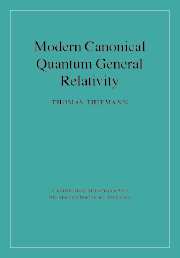Book contents
- Frontmatter
- Contents
- Foreword, by Chris Isham
- Preface
- Notation and conventions
- Introduction: Defining quantum gravity
- I CLASSICAL FOUNDATIONS, INTERPRETATION AND THE CANONICAL QUANTISATION PROGRAMME
- II FOUNDATIONS OF MODERN CANONICAL QUANTUM GENERAL RELATIVITY
- III PHYSICAL APPLICATIONS
- 12 Extension to standard matter
- 13 Kinematical geometrical operators
- 14 Spin foam models
- 15 Quantum black hole physics
- 16 Applications to particle physics and quantum cosmology
- 17 Loop Quantum Gravity phenomenology
- IV MATHEMATICAL TOOLS AND THEIR CONNECTION TO PHYSICS
- References
- Index
17 - Loop Quantum Gravity phenomenology
Published online by Cambridge University Press: 04 August 2010
- Frontmatter
- Contents
- Foreword, by Chris Isham
- Preface
- Notation and conventions
- Introduction: Defining quantum gravity
- I CLASSICAL FOUNDATIONS, INTERPRETATION AND THE CANONICAL QUANTISATION PROGRAMME
- II FOUNDATIONS OF MODERN CANONICAL QUANTUM GENERAL RELATIVITY
- III PHYSICAL APPLICATIONS
- 12 Extension to standard matter
- 13 Kinematical geometrical operators
- 14 Spin foam models
- 15 Quantum black hole physics
- 16 Applications to particle physics and quantum cosmology
- 17 Loop Quantum Gravity phenomenology
- IV MATHEMATICAL TOOLS AND THEIR CONNECTION TO PHYSICS
- References
- Index
Summary
Beyond merely checking whether we have a quantum theory of the correct classical theory, namely General Relativity coupled to all known matter, quantum gravity has certainly a huge impact on the whole structure of physics. For instance, if the picture drawn in Chapter 12 is correct, then one must do quantum field theory on one-dimensional polymer-like structures rather than in a higher-dimensional manifold, presumably the ultraviolet divergences disappear and while there are still bare and renormalised charges, masses, etc., the bare charges will presumably be finite while the renormalised charges should better be called effective charges because they simply take into account physical screening effects.
Quantum gravity effects are notoriously difficult to measure because the Planck length is so incredibly tiny. It may therefore come as a surprise that recently physicists have started to seriously discuss the possibility of measuring quantum gravity effects, mostly from astrophysical data and gravitational wave detectors [503–506]. See also the discussion in the extremely beautiful review by Carlip [9] and references therein. Those who laugh at these ideas are recommended to have a look at the historical remarks in [872], which draws an analogy with the situation at the end of the nineteenth century when it was widely believed that it would never be possible to detect atomic effects. Einstein showed that the atomic structure of matter was not directly, but indirectly, visible through collective effects, in this case Brownian motion, and what we are about to describe goes in the same direction.
The challenge is of course to compute quantum gravity effects within Quantum General Relativity or more specifically LQG.
- Type
- Chapter
- Information
- Modern Canonical Quantum General Relativity , pp. 572 - 574Publisher: Cambridge University PressPrint publication year: 2007



